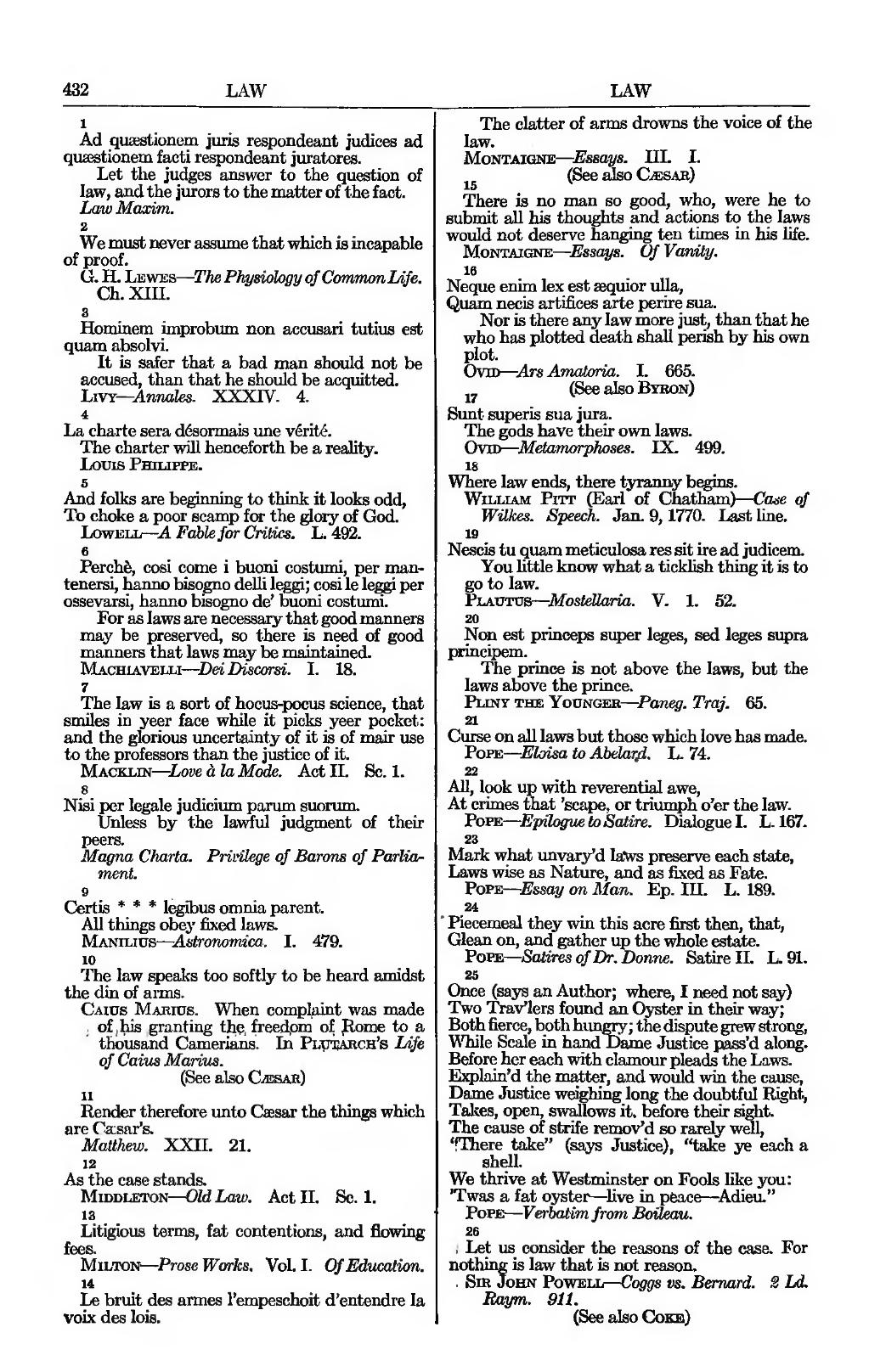Ad quaestionem juris respondeant judices ad quaestionem facti respondeant juratores.
Let the judges answer to the question of law, and the jurors to the matter of the fact.
We must never assume that which is incapable
of proof.
G. H. Lewes—The Physiology of Common Life.
Ch. XIII.
Hominem improbum non accusari tutius est
quam absolvi.
It is safer that a bad man should not be
accused, than that he should be acquitted.
Livy—Annates. XXXIV. 4.
La charte sera desormais une verity.
The charter will henceforth be a reality.
Louis Philippe.
And folks are beginning to think it looks odd,
To choke a poor scamp for the glory of God.
| author = Lowell
| work = A Fable for Critics. L. 492.
Perche, cosi come i buoni costumi, per mantenersi, hanno bisogno delli leggi; cosi le leggi per
ossevarsi, hanno bisogno de' buoni costumi.
For as laws are necessary that good manners
may be preserved, so there is need of good
manners that laws may be maintained.
Machiavelli—Dei Discorsi. I. 18.
The law is a sort of hocus-pocus science, that
smiles in yeer face while it picks yeer pocket:
and the glorious uncertainty of it is of mair use
to the professors than the justice of it.
Macklin—Love a la Mode. Act II. Sc. 1.
Nisi per legale judicium parum suorum.
Unless by the lawful judgment of their
peers.
Magna Charta. Privilege of Barons of Parliament.
Certis * * * legibus omnia parent.
All things obey fixed laws.
Manilius—Astronomica. I. 479.
The law speaks too softly to be heard amidst
the din of arms.
Caius Marius. When complaint was made
, of ,his granting the, freedom of Rome to a
thousand Camerians. In Plthjarch's Life
of Caius Marius.
Render therefore unto Cæsar the things which
are Cæsar's.
Matthew. XXII. 21.
As the case stands.
Middleton—Old Law. Act II. Sc. 1.
Litigious terms, fat contentions, and flowing
fees.
| author = Milton
| work = Prose Works. Vol. I. Of Education.
Le bruit des armes l'empeschoit d'entendre la
voix des lois.
The clatter of arms drowns the voice of the
law.
Montaigne—; Essays. III. I.
| seealso = (See also Cesar)
| topic = Law
| page = 432
}}
{{Hoyt quote
| num =
| text = <poem>There is no man so good, who, were he to
submit all his thoughts and actions to the laws
would not deserve hanging ten times in his life.
Montaigne—Essays. Of Vanity.
Neque enim lex est aequior ulla,
Quam necis artifices arte perire sua.
Nor is there any law more just, than that he
who has plotted death shall perish by his own
plot.
Ovid—Ars Amatoria. I. 665.
| seealso = (See also {{sc|Byron)
Sunt superis sua jura.
The gods have their own laws.
Ovid—Metamorphoses. IX. 499.
Where law ends, there tyranny begins.
Nescis tu quam meticulosa res sit ire ad judicem.
You little know what a ticklish thing it is to
go to law.
Plautus—MosteHaria. V. 1. 52.
Non est princeps super leges, sed leges supra
principem.
The prince is not above the laws, but the
laws above the prince.
Pliny the Younger—Paneg. Traj. 65.
Curse on all laws but those which love has made.
| author = Pope
| work = Eloisa to Abelarfl. L. 74.
All, look up with reverential awe,
At crimes that 'scape, or triumph o'er the law.
| author = Pope
| work = Epilogue to Satire. Dialogue L L. 167.
Mark what unvary'd laws preserve each state,
Laws wise as Nature, and as fixed as Fate.
| author = Pope
| work = Essay on Man.
| place = Ep. III. L. 189.
Piecemeal they win this acre first then, that,
Glean on, and gather up the whole estate.
| author = Pope
| work = Satires of Dr. Donne. Satire II. L. 91.
Once (says an Author; where, I need not say)
Two Trailers found an Oyster in their way;
Both fierce, both hungry ; the dispute grew strong,
While Scale in hand Dame Justice pass'd along.
Before her each with clamour pleads the Laws.
Explain'd the matter, and would win the cause,
Dame Justice weighing long the doubtful Right,
Takes, open, swallows it, before their sight.
The cause of strife remoVd so rarely well,
'fThere take" (says Justice), "take ye each a
shell.
We thrive at Westminster on Fools like you:
'Twas a fat oyster—live in peace—Adieu."
| author = Pope
| work = Verbatim from Boileau.
{{Hoyt quote
| num = | text = <poem>i Let us consider the reasons of the case. For
nothing is law that is not reason. . Sm John PowELii—Coggs vs. Bernard. 2 Ld. Raym. 911.
| seealso = (See also {{sc|Coke)
